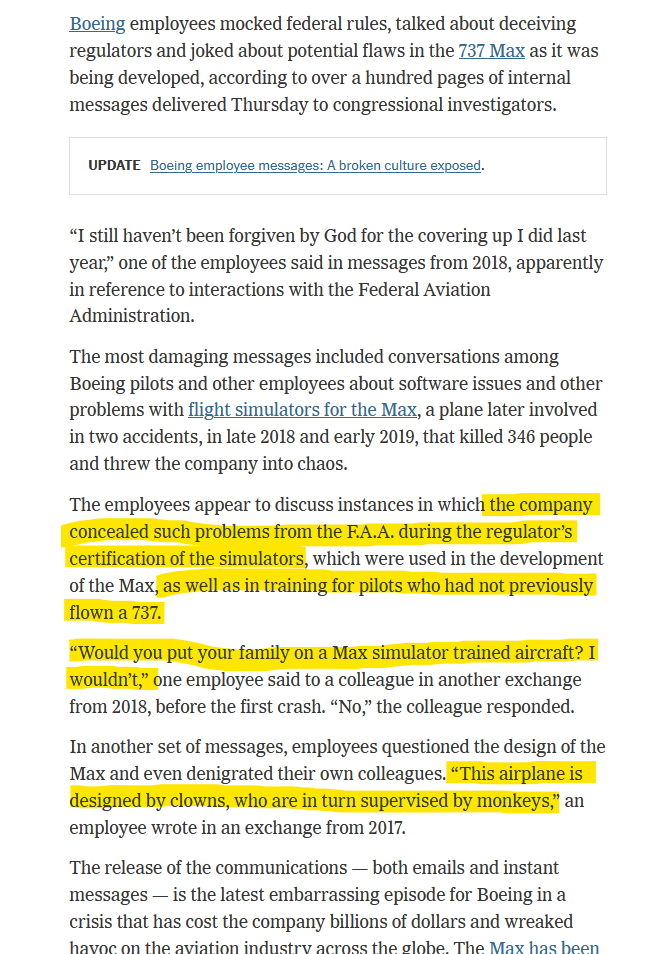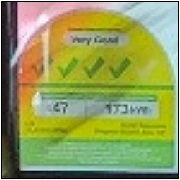(Thread IKs:
skooma512)
|

|
|
|
|

|
| # ? Jun 8, 2024 07:56 |
|
Lol yeah, probably not his nanny and gardener and spending tens of thousands eating out though.
|
|
|
|
[Me, cruising along on billions of dollars of roads in my car(s) that only cost $5630 a year] man this hurts
|
|
|
|
dont know why shrike doxxed himself but i respect it
|
|
|
|
that's made up as gently caress, poster's claiming they spend more on cleaning than they do on "insurance" (what insurance) or healthcare I'm supposed to believe this person is so attentive to their finances that they track all this poo poo down to the dollar but there's one line item for "insurance" and also it's only $2789 for a family of four
|
|
|
|
Frosted Flake posted:Can someone explain the theory of QE to me? It seems like it was always going to end in tears. Simply put, quantitative easing is a fancy term for a strategy that turbocharges a national central bank's ability to influence "interest rates" by buying up debt from commercial banks or selling debts to banks. The central economic theory that animates QE is neoliberalism. Another way to think about neoliberalism is that it's a "bank-run economy" instead of a "producer-consumer economy". This means that the major mandate of the Federal Reserve is that by allowing banks to run the economy, you can directly impact the producer-consumer economy. Under normal operating conditions, commercial banks are required to keep a certain amount of reserves on hand. To handle the fluctuating reserves, banks "borrow" from the Federal Reserve at a rate that is set by them. This ripples out into the regular economy as banks will pass on that cost and may require you to pay higher interest on things like car loans and homes, which has an inverse relation on price. In theory, when interest rates are high, home prices come down, and therefore the economy "slows" as less people are spending money. A unique attribute of commercial banks is that they effectively create money out of "thin air". Due to reserves being just a small percentage required to cover its assets, banks can create loans out of nothing. From the commercial bank's perspective, any savings that is deposited with them is a liability - they are on the hook to being able to give you your money when you want it. Conversely, debt products they introduce into the market is an asset from their point of view. Said another way - the loan you take from a bank is a liability from your point of view, but for a bank, that's a productive asset in which they receive both interest and will recoup your eventual principal. Even more simply - banks exist to introduce debt into the economy, which are then used to make claims ONTO the producer-consumer economy. Thus, a bank run economy means that credit is extremely important. There has to be enough businesses and people to proliferate loans onto, and there has to be enough real assets (such as houses) for those loans to then be applied to. What ends up happening in these circumstances is that there's only a finite amount of real assets that can be secured with debt - but debt itself is infinite. Debt can be created out of nothing, and since it is compounded, has an exponential rate of return than normal assets. Think of credit card debt as an example - one of the reason why people are buried is that they are paying minimum payments but after a year, they end up owing more than they started with (assuming something like a 20% rate) In such cases, speculation becomes not only rampant, but the only way to grow such an economy. A key component to this is assets end up inflating. A common misunderstanding is why housing prices rise at all - it's not tied to the real value of land nor the goods and services provided by things like libraries, parks, etc, but by banks inflating prices of houses by appraising them higher and higher in order for loans to be secured against them. This is why housing nearly took out the entire world's economy in 2007 - as banks became ultra wealthy by proliferating as much debt and asset inflation into the economy, eventually wages and productivity could no longer keep up. Nearly 80% of all debt in the US is tied to housing and mortgages - if housing teeters, banks fall, and therefore, countries fall. QE is a response to this debt proliferation that occurs in an economy that is run by credit. To stabilize the bad debt that ends up staying on the books of banks, instead of writing them down and restructuring the economy in a clean slate, QE attempts to stabilize banks by infusing them with "cheap" credit. The fed effectively reduces interest so low by swapping bonds that they also create out of thin air to commercial and institutional banks. Note that this means that banks are literally getting nearly free money, sometimes even EARNING money when interest rates become negative, as the Fed proliferates the economy with credit. The effect of this is that this money is then lent out by commercial banks for all sorts of ventures. In theory, this is supposed to go to productive forces - IE, loans to a company that will open a new factory and employ people. In reality, due to rates of return being much higher from financial speculation than actually investing into real assets like factories, plants, etc, all of this credit ends up going into equally speculative ventures - things like derivates, credit swaps, fly by night tech companies, etc.
|
|
|
|
dk2m posted:Simply put, quantitative easing is a fancy term for a strategy that turbocharges a national central bank's ability to influence "interest rates" by buying up debt from commercial banks or selling debts to banks. Bofa deez nuts
|
|
|
|
dk2m only makes 🐐-tier posts.
|
|
|
|
Danann posted:https://twitter.com/snekotron/status/1744805968632783142 very cool https://x.com/heimbergecon/status/1744634832238313662
|
|
|
|
dk2m posted:Simply put, quantitative easing is a fancy term for a strategy that turbocharges a national central bank's ability to influence "interest rates" by buying up debt from commercial banks or selling debts to banks. 
|
|
|
|
easing is how number feels when it takes a poo poo and the more poo poo it takes the more quantitative it is
|
|
|
|
quantitative easing is like guaranteed income but for banks as they are more important than us
|
|
|
|
Basically the point where the economy becomes so abstracted that material production no longer matters at all, and is in fact treated as a drag because it requires actual inputs and paying people to provide them.
|
|
|
|
Ghost Leviathan posted:Basically the point where the economy becomes so abstracted that material production no longer matters at all, and is in fact treated as a drag because it requires actual inputs and paying people to provide them. anyways, the problem with that is that (as long as there any humans around under some form of subjugation) is it needs a heavy militaritized (and associated intelligence/state/etc) to protect the fictitious production. otherwise the human(s) will kick over the machine. so it needs a material base to sustain a military to protect its interests. this then spirals out like a fractal. we lol at how stupid nato/us and all the MIC is, and it is insanely wasteful and evil, but from an plutocratic elite perspective, it's the most important function of the state. so infinite money can go in as long as it protects the petrodollar and global hegemony of capital, it's doing it's one singular sole function.
|
|
|
|
this is from 2020 but lol: The New York Times: Boeing Employees Mocked F.A.A. and ‘Clowns’ Who Designed 737 Max 
|
|
|
|
"Designed by clowns who are supervised by monkeys" I'm sorry you'll need to narrow it down a bit. That could apply to almost anything over the past 10 years.
|
|
|
|
Under capitalism, competence and diligence are considered flaws to be corrected.
|
|
|
|
dk2m posted:Simply put, quantitative easing is a fancy term for a strategy that turbocharges a national central bank's ability to influence "interest rates" by buying up debt from commercial banks or selling debts to banks. Another thing is the connection of low rates and QE and its affect on government bonds and the USD. The Federal Reserve (or really any central bank) can effectively control yields by setting interest rates (also there is little reason to take bonds at a lower yield if you can find better rates elsewhere). The US through most of the 2010s and then the COVID era, was financing itself with low rates because it could take on higher and higher amounts of debt but pay relatively minimal interest on them. Quantitative easing at points allowed them to push these yields even further because the central bank was also buying them on the side with the cash that it created, thus forcing artificial demand. During COVID, yields reached nearly rock bottom because the Fed was creating such demand. The issue is that this has a relative negative effect on the value of the US dollar since you are increasing the supply of dollars. This is sometimes not a huge issue if other major governments are doing the same (again the Eurocrisis/COVID) because wealth has to go somewhere, but at the same time, if the US is lowering rates on its own, it is going to cause a relative flight from the US. The stock market is elevated in part because the USD has been getting modestly weaker and that wealth is going to seek out returns. You get into a larger problem for the US government, though as higher energy costs are forcing higher rates (and therefore yields) and you can't go back to using QE because it is only going to weaken the USD and possibly cause devaluation. The US still wants lower rates (in part because it is paying an increasing amount of interest on its debt) but as long as inflation is persistent not only in the US but in Europe, it is greatly slowing that effort. The ultimate desire for the US government would be cheap energy prices, and minimal inflation if not deflation so it has excuse to return to low rates and printing which would absolutely flood asset markets again.
|
|
|
|
https://twitter.com/KobeissiLetter/status/1744961476937256969
|
|
|
|
The Japanese Yen is also at some of its lowest levels since the 1990s as well. The Yen lost about 40% of its value since mid-2020.
Ardennes has issued a correction as of 12:22 on Jan 10, 2024 |
|
|
|
Ardennes posted:The Japanese Yen is also at some of its lowest levels since the 1990s as well. oh please dont check median real incomes too
|
|
|
|
Palladium posted:oh please dont check median real incomes too You could argue that the Japanese stock market is if anything rising in inverse to the quality of life of average Japanese people in real time.
|
|
|
|
yeah it's still quite amazing how well the US has done compared to every other country over the past couple decades 15 years of 14% uplift in the broader stock market, 20+% if you look at specific sectors like tech. we're at a point where we've had a generation of folks transition from student to retiree due to the bull markets
|
|
|
|
Ardennes posted:You could argue that the Japanese stock market is if anything rising in inverse to the quality of life of average Japanese people in real time. wow sounds like america too
|
|
|
|
SlimGoodbody posted:I wonder what God thinks when he lines up the slot machine on someone's life to ensure they're sufficiently hot and surrounded by enough drama/notoriety to get almost $60 million dollars in a year because of it. Like, does he do it just to watch the person's brain lay awake at night thinking about how absolutely unreal it all is? And then he like tabs over to some kid born with an inside out head who will remain trapped in a minotaur's labyrinth forever, and laughs to himself? Amouranth and CWC are alive at the same time, on the same planet. I'd vote for Joe Biden if he abolished labyrinths
|
|
|
|
Palladium posted:wow sounds like america too It may be even worse in Japan because they are so reliant on import; when the Japanese Yen devalues, it directly means the cost of living directly shoots up.
|
|
|
|
Ardennes posted:It may be even worse in Japan because they are so reliant on import; when the Japanese Yen devalues, it directly means the cost of living directly shoots up. you seem to have a problem, would you like more tomahawks and ospreys?
|
|
|
|
shrike82 posted:yeah it's still quite amazing how well the US has done compared to every other country over the past couple decades just imagine being this dude. like really imagine the kind of person who apparently has so little to do with his life that he trundles into places like this to… idk be a loving jerk? lol
|
|
|
|
If you put your money into a series of bonds of around 5.5-6% from 2006, you would be close to matching the performance of the S&P 500 and that is taking consideration the 2020-2021 bubble. (If you bought at the top of the bubble, you may actually have lost versus inflation versus today.) At the end of the day, the stock market is going to be significant risks just based on the fact it is not really only individual companies but its movement is based on interest rates/QE and therefore energy prices and they are simply difficult to predict (not to mention random world events causing sudden shifts). In the end, if you put some money into an index fund or whatever, no one sane is going to dump their life savings into the market for a reason. Ardennes has issued a correction as of 13:10 on Jan 10, 2024 |
|
|
|
Taima posted:just imagine being this dude. like really imagine the kind of person who apparently has so little to do with his life that he trundles into places like this to… idk be a loving jerk? lol if i remember right there was like a c-level executive that had some similar kinda gimmick in yospos
|
|
|
|
shrike82 posted:yeah it's still quite amazing how well the US has done compared to every other country over the past couple decades 5.5% growth in real wages during that time. surplus value go brrrr 
|
|
|
|
text editor posted:When I lived in the northern part of the state one of the Amish kids on our bus bragged to us multiple times that he would get to stop school after 8th grade to work on the family farm so maybe there's something to this GameCube ftw
|
|
|
|
Xaris posted:the most surprising thing about this was finding out 3M still had a pension plan. but there's good news at the end My mother was offered one of those. She's got over 100k saved up, good enough for her needs. She is almost 75, and does not have another 10-15 years left. So this company (I don't know the name) offered to pay her a defined amount until she died, but then they keep the remainder when she dies. If she lives beyond anything we're expecting, they would be out of pocket but what are the chances of that? Basically, give us ALL your money now, we'll trickle it back to you for a few years and then keep the rest. Sounds good? Sign here please. I don't really care about her "using up" her retirement and not passing anything down. I hope my youngest brother gets it all. But it galls me that she's already been persuaded to get Medicare Advantage, now she's getting pushed into this crap. Of course one of the "benefits" was that your retirement income would be 'safeguarded' against Medicare Advantage clawbacks. Wait, what?
|
|
|
|
Medicare advantage has been the quiet Medicare privatization effort that's getting close to completion. Lol my boss at my old job is from western PA and loved to tell us how loving dire it is out there and how all rural health care has been shuttered so you have to go 4 hours to Pittsburgh for anything. This has been a trend for the past couple decades all across rural america. Health care is doing great! More hospitals closing due to unprofitability in my area and I keep hearing about places doing layoffs despite everyone still being critically understaffed thanks to the whole fucky wucky that was (and still is) covid. Completely unrelated, I anecdotally noticed a drop off in quality of care and increase in deaths last year at my hospital. Asproigerosis has issued a correction as of 14:20 on Jan 10, 2024 |
|
|
|
gradenko_2000 posted:this is from 2020 but lol: https://x.com/CBSMornings/status/1745071201435767152?s=20
|
|
|
|
Asproigerosis posted:Medicare advantage has been the quiet Medicare privatization effort that's getting close to completion. Whenever I'm in the waiting room here at least half the people had to drive out 2+ hours and they're only there to talk to the doctor for 5 minutes and maybe get some blood testing. There's millions of people who have to do this because we decided people in places like Erie or Wheeling aren't economically worthy of anything beyond a couple of GPs who hate their jobs and hate you.
|
|
|
|
Maybe men just aren't cut out for leading manufacturing companies Look at this one, blubbering like a baby. Too emotional. Too driven by their masculine needs.
|
|
|
|
Our society really undervalues the emotional labor of CEOs.
|
|
|
|
Beached Whale posted:Whenever I'm in the waiting room here at least half the people had to drive out 2+ hours and they're only there to talk to the doctor for 5 minutes and maybe get some blood testing. There's millions of people who have to do this because we decided people in places like Erie or Wheeling aren't economically worthy of anything beyond a couple of GPs who hate their jobs and hate you. Erie has PSU supported healthcare doesn't it? Wheeling should be given back to nature.
|
|
|
|

|
| # ? Jun 8, 2024 07:56 |
|
Pittsburgh Fentanyl Cloud posted:that's made up as gently caress, poster's claiming they spend more on cleaning than they do on "insurance" (what insurance) or healthcare their employers pay their health insurance and they live & garage their cars in an all white suburb so homeowner/car insurance rates are low
|
|
|




































